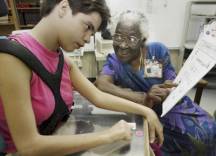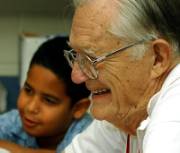
back
Want
to support Global Action on Aging?
Click
below:

Thanks! |
 |
Foster
Grandparent program diversifies throughout South Florida
By Diane C. Lade
South Florida Sun-Sentinel, June 9, 2003
 Foster
grandparent Lillian Williams, 92, reads to student Megan Exterkamp, 17, at
the Seagull School in Fort Lauderdale. The national program began in 1965
and includes more than 400 people in Broward and Palm Beach counties. Foster
grandparent Lillian Williams, 92, reads to student Megan Exterkamp, 17, at
the Seagull School in Fort Lauderdale. The national program began in 1965
and includes more than 400 people in Broward and Palm Beach counties.
Every weekday, Lillian Williams heads into work.
She's a grandparent. Loving is her job.
"It
keeps me young," laughs Williams, an exuberant 92. "The Lord is
keeping me here for these children, and I'm proud of it."
 Alex
Roberts, 91, helps third-grader Jannier Lafuente, 9, with his reading
skills at Central Elementary School in ruralOkeechobee. Foster
Grandparents help students, hospital patients and juvenile offenders. Alex
Roberts, 91, helps third-grader Jannier Lafuente, 9, with his reading
skills at Central Elementary School in ruralOkeechobee. Foster
Grandparents help students, hospital patients and juvenile offenders.
Alex Roberts,
91, is a grandparent, too -- among the first at a rural elementary school
near the tip of Lake Okeechobee. His job?
"He helps me understand the story more," says Stanausha McNeil,
9, one of the third-graders Roberts guides through extra reading sessions.
Williams and Roberts are Foster Grandparents, members of what's thought to
have been the nation's first volunteer program exclusively for seniors. It
was created in 1965 under the Older Americans Act.
Today, the program is more than 14,000 strong, with seniors age 60 and
older going into public schools, Head Start programs, hospitals and
juvenile offender centers.
Palm Beach County didn't start Foster Grandparents until 1998 and now has
about 210 grandparents. But Broward County's grandparents were among the
first, having started with about 70 in the program's national inaugural
year and grown to 234 today.
South Florida has seen changes in those 38 years, and so has its Foster
Grandparent programs. Most of the volunteers are at least in their 70s
now.
They are an increasingly diverse group: About 56 percent of Broward and
Palm Beach counties' programs are black, and more Spanish- and
Creole-speaking people are enlisting as the area's immigrant senior
population increases.
"When you look at pictures of our Foster Grandparents from years ago,
you see almost all white men and women," said John Gargotta,
executive director of Broward Grandparents, the nonprofit agency that runs
the program. "We're getting more Hispanics and Haitians now, which is
what we need in our schools."
Williams, a former insurance agent and longtime Dania resident, agrees
there were fewer black grandparents when a friend recruited her 28 years
ago. But it's not something she really notices.
For Williams -- assigned to the Seagull School, a Fort Lauderdale program
helping physically disabled children and teens -- it's all about the
students. Some live in group homes and rarely see their own parents, let
alone their grandparents.
"She's our grandma. Nobody else's," says Assistant Principal
Marti Moore.
When she first came to Seagull, Williams was a little unnerved by
youngsters who were strapped into wheelchairs, who could not hold a pencil
and said good morning with a guttural cry.
But soon they were her grandkids in spirit. Kids such as the ever-smiling
Danielle Hopkins, 18, who despite her cerebral palsy can drive her
wheelchair with controls placed near her head and communicate with a
spelling board activated by taps from her left knee.
"I loved them, and they loved me," says Williams.
Program organizers think one reason more minorities have come into Foster
Grandparents is that applicants, although they are called volunteers, earn
a $2.65-an-hour tax-free stipend if they fall below a certain income,
about $11,225 annually for a single person. Elderly minorities, whose
average earnings are lower, are more likely to qualify.
About two-thirds of the program's budget, amounting to around $1.6 million
for Broward and Palm Beach counties' grandparents, comes from the federal
government. Local governments, the United Way and charities make up the
rest.
The stipend helps some buy medications and food. But if it were rescinded
tomorrow, Williams and most of the other grandparents say they would stay.
Some become so attached to the teachers they serve, they follow if the
teacher transfers to another school, even if it means a longer drive.
The Corporation for National and Community Service, the nonprofit
organization managing Foster Grandparents nationwide, has discussed
getting Congressional approval to lower the program's age limit to 55 and
raise the income requirements to entice new volunteers.
"The grandparents now are often older people who eventually get sick
and have to withdraw," said spokeswoman Jan Newsome. "We need to
keep the program growing."
In South Florida, Foster Grandparents is doing that by going boldly where
they have never been. The Area Agency on Aging of Palm Beach/Treasure
Coast, which manages aging services in a five-county area, in December
placed its first grandparents in rural Okeechobee.
Three landed at Central Elementary, home of the Panthers and a place where
up to three generations have squirmed through their lessons. Alex Roberts
is a relative newcomer in the town, known for its vegetable farms. He
moved there 20 years ago, already retired from the printing business and
with grandchildren of his own.
Although they never had grandparents before, the Central teachers were so
taken with them that they nominated Roberts for a Prime Time Award, an
honor given to six outstanding volunteers by the area agency annually. In
May, Roberts became the first Foster Grandparent to win.
Sharon Nipper, a Central kindergarten teacher who had grandparent Ann Long
assigned to her room, wishes there were one for every classroom.
"They're good for the children, who don't always get the extra
attention they deserve," she said.
Roberts initially volunteered at Okeechobee's senior center, dishing out
lunches. "But I wanted to steer clear of old people," said
Roberts, who like Williams is the oldest member of his Foster Grandparents
program.
Now, like the other volunteers, he spends 20 hours a week in the
classroom. Palm Beach County's grandparents concentrate on reading
improvement, and Mr. Roberts, as the children call him, spends his day
listening to halting tales of brave animals and firemen and happy endings.
"When you see something all in capital letters, say it like you're
strict. Like you're a teacher," he coaches Stanausha, one of three
girls wading through a story about Gloria, a police dog that is rewarded
with ice cream.
Later, the conversation turns to swimming and the importance of the buddy
system. Roberts mentions he learned to swim as an Army recruit in Miami
Beach during World War II.
"Who was your buddy?" asks Whitney Sweet, 9. Roberts pauses.
"I don't remember," he says. "It was a long time ago."
Copyright © 2002 Global
Action on Aging
Terms of Use | Privacy
Policy | Contact Us |

